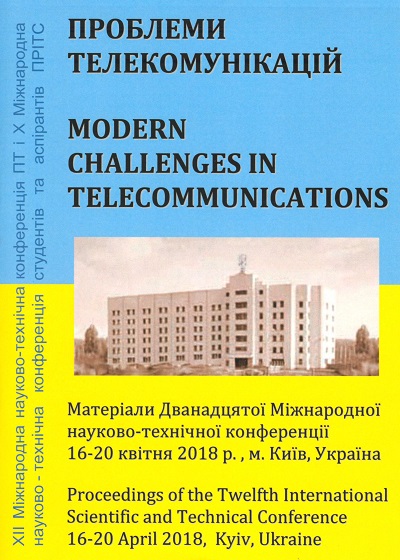АНАЛІЗ ВПЛИВУ ХРОМАТИЧНОЇ ДИСПЕРСІЇ В ОПТИЧНИХ ТРАКТАХ НА ФУНКЦІОНУВАННЯ ТЕЛЕКОМУНІКАЦІЙНИХ СИСТЕМ
Анотація
One of the most effective methods for solving this problem is the WDM (Wavelength Division Multiplexing) optical waveguide compaction method. The use of this method has allowed to increase the throughput of fiber-optic systems to a value greater than 10 Tbit / s, which will ensure that the needs of today and the next 3-5 years will be exceeded.
Посилання
Фриман Р. Волоконно-оптические системы связи. – М.: Техносфера, 2003. – 440 с.
Бейли Д. Волоконная оптика, теория и практика. – М.: Кудиц-обрез, 2006. – 326 с.
Слепов Н.Н. Современные технологии цифрових оптоволоконних сетей связи. – М.: Радио и связь, 2003. – 468 с.
Каток В.Б., Руденко І.Е., Ранський Є.Г., Однорог П.М. Волоконно – оптичний зв'язок. – К., Логос, 2015. – 380 с.
Хмелев К.Ф. Основы фотонного транспорта. – Киев: Техніка. 2008. – 680 с.
Бердников О.М., Хмельов К.П. Застосування технології WDM на телекомунікаційних мережах / Збірник наукових праць ВІТІ НТУУ “КПІ”. – 2003. – № 3. – с. 5…11.
##submission.downloads##
Як цитувати
Номер
Розділ
Ліцензія
Авторське право (c) 2018 Василь Степанович Романишин, Олег Михайлович Бердников

Ця робота ліцензується відповідно до Creative Commons Attribution 4.0 International License.
Authors who submit to this conference agree to the following terms:a) Authors retain copyright over their work, while allowing the conference to place this unpublished work under a Creative Commons Attribution License, which allows others to freely access, use, and share the work, with an acknowledgement of the work's authorship and its initial presentation at this conference.
b) Authors are able to waive the terms of the CC license and enter into separate, additional contractual arrangements for the non-exclusive distribution and subsequent publication of this work (e.g., publish a revised version in a journal, post it to an institutional repository or publish it in a book), with an acknowledgement of its initial presentation at this conference.
c) In addition, authors are encouraged to post and share their work online (e.g., in institutional repositories or on their website) at any point before and after the conference.

